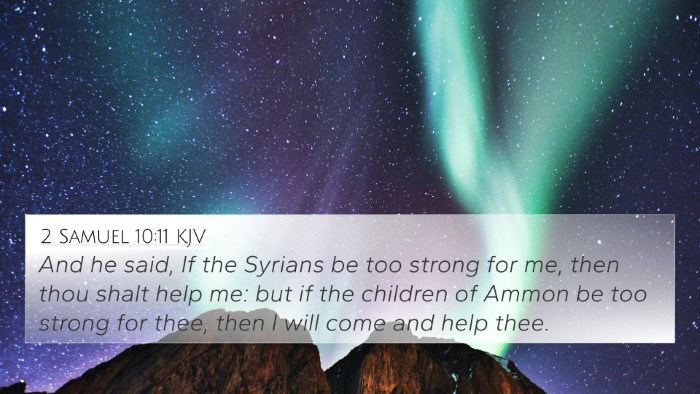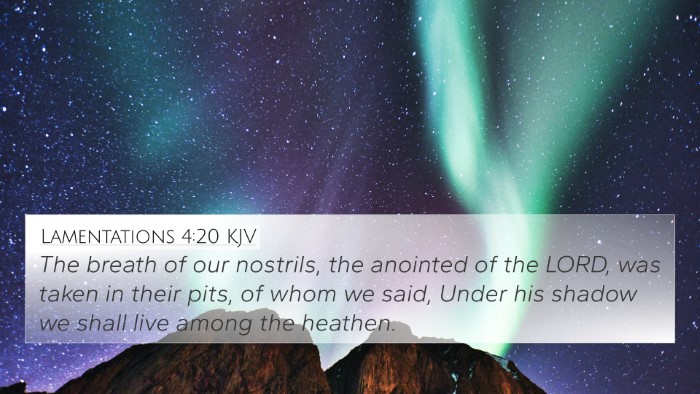Understanding 2 Samuel 18:3
The verse 2 Samuel 18:3 states:
“But the people said, ‘You shall not go out; for if we flee away, they will not care about us. Nor if half of us die will they care about us; but you are worth ten thousand of us. Therefore, it is better that you send us help from the city.’”
This verse occurs during a critical moment in the narrative of Absalom's rebellion against his father, King David. The people express their deep concern for David's safety and the implications of his involvement in battle.
Summary of Commentary Insights
Matthew Henry's Commentary
Matthew Henry emphasizes the loyalty and love that David's followers have for him. They believe that losing the king would be a greater loss than their own lives. This highlights David’s value not just as a ruler but as a beloved leader, suggesting that a leader's worth often surpasses the numerical strength of the soldiers.
Albert Barnes' Notes
Albert Barnes points out the tactical counsel from David's men who argue that his presence on the battlefield would result in greater danger. They value his life immensely, indicating that his leadership is pivotal to their morale. This reinforces the theme of the importance of leadership in times of crisis.
Adam Clarke's Commentary
Adam Clarke notes that this verse reflects the principle that in military strategy, the king’s life is of utmost importance. The soldiers believe if David falls, the entire cause would be jeopardized, hence they plead for him to remain in safety while they confront their enemies, showing their dedication to both David and their mission.
Key Themes and Insights
- The Value of Leadership: The verse illustrates that a good leader is invaluable to his people.
- Concern for Community: There is a heartfelt concern for the king’s safety over the lives of the soldiers.
- Strategic Wisdom: It is a wise decision to keep the leader safe to ensure the survival of the movement.
Cross References
Several other Bible verses resonate with the themes found in 2 Samuel 18:3. These cross-referenced scriptures help to deepen the understanding of leadership, loyalty, and community:
- 1 Samuel 18:1-3: Discusses David's close relationship with Jonathan, showing bonds of loyalty.
- Proverbs 11:14: Aligns with the principle that safety is found in a multitude of wise counsel.
- 1 Chronicles 12:1-2: Details David's mighty men who were dedicated and loyal to him.
- 2 Samuel 15:15: Reflects the people's loyalty during Absalom's insurrection.
- Psalm 20:7: Expresses trust in the Lord instead of in chariots and horses, paralleling David’s reliance on God amidst conflict.
- 1 Corinthians 12:12-13: Discusses the body of Christ, emphasizing the value of every member.
- Philippians 2:3-4: Encourages selflessness and consideration for others, mirroring the sentiments of David’s men.
Thematic Connections
The themes in 2 Samuel 18:3 can be seen in several other scriptural contexts, exploring the nature of sacrifice for the sake of others, the crucial role of a leader, and the intricate connections that exist between followers and their leader during tumultuous times.
Tools for Understanding Bible Cross-References
To explore the connections between Bible verses, one can utilize various resources:
- Bible Concordance: A guide that lists verses and words to help find connections in scripture.
- Cross-Reference Bible Guide: Provides references next to verses for deeper study.
- Bible Chain References: Lists verses that link together thematically or contextually.
- Cross-Referencing Bible Study Methods: Techniques to compare and analyze verses across the Bible.
Conclusion
2 Samuel 18:3 serves as a profound reminder of the weight of leadership and the communal bonds that thrive in times of adversity. Through biblical commentary and cross-reference analysis, one can appreciate the value of David’s life not just as a king but as a central figure to his people’s hopes and loyalty. The insights gained from this verse enrich our understanding of the interplay between leaders and followers, especially in the context of spiritual and communal guidance.









